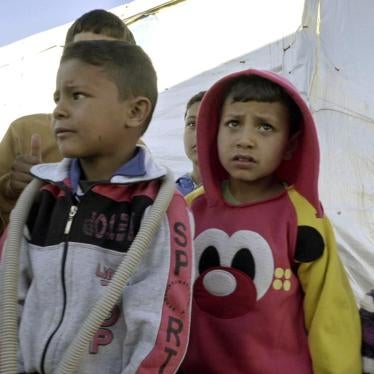Millions of dollars in aid money pledged to get Syrian refugee children in school last year did not reach them, arrived late, or could not be traced due to poor reporting practices.
In a report released today, “Following the Money: Lack of Transparency in Donor Funding for Syrian Refugee Education,” Human Rights Watch tracks pledges made at a conference in London in February 2016. We followed the money trail from the largest donors to education in Lebanon, Turkey, and Jordan, the three countries with the largest number of Syrian refugees, but found large discrepancies between the funds that the various parties said were given and the reported amounts that reached their intended targets in 2016. The lack of timely, transparent funding contributed to the fact that more than 530,000 Syrian children in those three countries were still out of school at the end of the 2016-2017 school year.
Donors and the refugee-hosting countries that neighbor Syria agreed at the London conference to enrol all Syrian refugee children in “quality education” by the end of the 2016-2017 school year – and to provide the needed funds. According to the six donors that pledged the biggest sums – the European Union, the United States, Germany, the United Kingdom, Japan, and Norway – their contributions alone exceeded the overall 2016 target of US$1.4 billion for education inside Syria and for refugee-hosting countries in the region. Yet, education budgets in countries hosting refugees were substantially underfunded.
Of the funding that was delivered, much came late, rather than well before the school year as London conference participants had agreed. As of early September 2016, funding for education in Jordan was still 69 percent short of targets under a UN-coordinated aid plan, and 47 percent short in Lebanon. The failure to deliver aid before the school year limits school systems’ capacity to hire and train teachers, purchase textbooks, and plan student intake, with the result that fewer Syrian children are able to realize their right to education.
In seeking to identify the source and impact of these funding shortfalls, our research revealed several underlying problems:
- A lack of consistent, detailed, timely reporting by donors, which often made it difficult or impossible to determine how much support individual donors have given for education in each host country, and when it arrived.
- Lack of information about the projects donors are funding, and their timetables. Public fund-tracking reports, databases, and other mechanisms often lack enough information to assess whether the projects being funded addressed the key obstacles to education for Syrian children,
- Inconsistent information about school enrollment, making it difficult to assess progress. Data are often based on different criteria, were collected at different times, or may account only for enrollment at the beginning of the school year rather than continued attendance.
- Inconsistent education targets and goals set by donors and host countries. The London conference co-hosts announced that all participants had agreed to enroll all Syrian children by 2017, but the Lebanese government announced a 5-year educational plan at the conference that will still leave more than 156,000 Syrian children out of public schools by 2021.
In the face of these challenges, there are several things Sweden, and the larger donor community, could do. As a large donor both bilaterally and through the EU, Sweden should seek to ensure that there is more detailed, comprehensive information on education aid to assess whether donors have met their own pledges and provided aid in a timely way, and whether the activities being funded address key obstacles that are keeping thousands of Syrian refugee children out of school. Sweden, as well as other donors, implementing agencies, and host governments need to know what programs are being funded to coordinate their efforts and avoid gaps or overlaps in aid.
Greater transparency could help to show why enrollment goals are being missed, identify the responsible parties, and pressure them to improve. It could pinpoint the extent to which host country policies, as opposed to insufficient donor funding, are keeping children out of school.
Any earmarking of funding for education should not result in shifting funding from other urgent needs, or tying the hands of implementing agencies or host country governments that may be best-placed to assess where resources are needed. Also, more funding may not help if host countries’ policies undermine children’s access to school. In some provinces in Turkey, for instance, Syrian refugees can face indefinite delays getting the identification card that children need to enroll in public schools. Lebanon has issued virtually no work permits to Syrian refugees, and many refugee families cannot afford school-related costs.
But in cases in which donors have pledged to support educational goals, failure to meet those pledges may undermine budgeting and planning education programs, harming the children whose access to school hangs in the balance. Donors should meet their own commitments for the amounts pledged, and ensure that their funding is more transparent, targeted, and timely.
To prevent a lost generation of Syrian children and help realize their right to education, the government should redouble the efforts to ensure that Sweden, EU, other donors and host countries improve transparency and accountability. They should publish up-to-date, detailed information on all funding committed, and received, to support education for Syrian and vulnerable host community children in Syria and neighboring countries, including multi-year commitments and disbursal dates.
They should also renew efforts to identify and overcome barriers that have thwarted universal enrollment for Syrian refugee children, revising policies accordingly, and publish data on school enrollment and attendance that are comparable, up-to-date, disaggregated by age and gender, and that account for dropouts.
Sweden, other donors, and host countries have promised that Syrian children will not become a lost generation, but this is exactly what is happening. More transparency in funding would help reveal the needs that aren’t being met so they could be addressed and get children into school.









